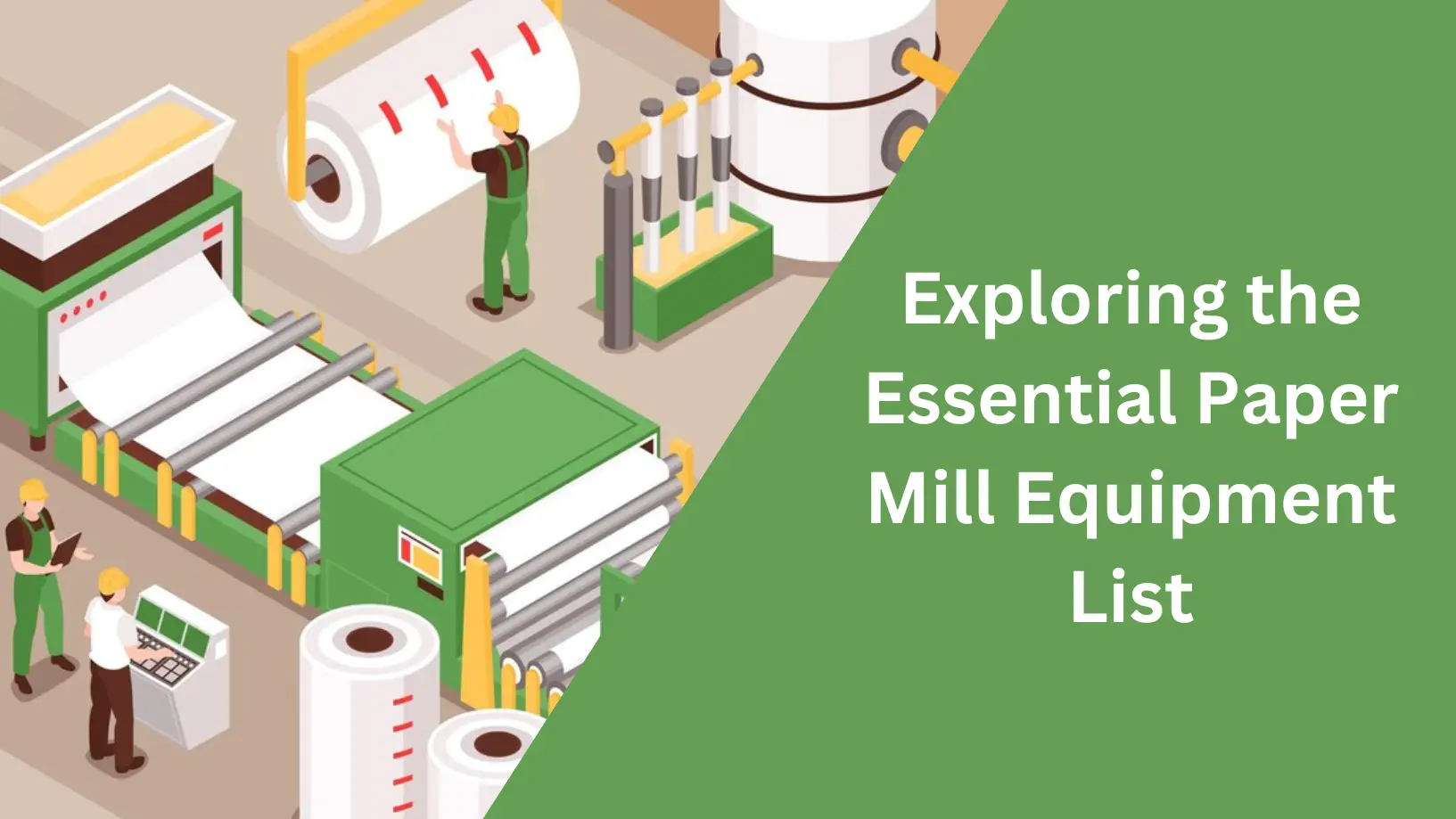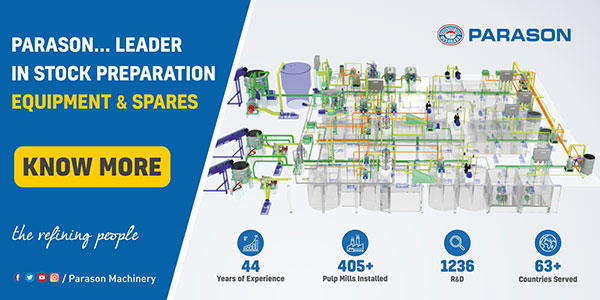Introduction
Are you planning to start or upgrade your paper mill? Wondering what are the machineries that are needed to set up a paper mill? Look no further! Below is a comprehensive Paper Mill Equipment List to guide you through the process.
There are 2 types of paper manufacturing processes, recycling and virgin. For both types of paper making processes, the machinery required is similar except some of them are needed for recycling paper only.
Let’s take a look at the paper mill equipment which are used in these paper manufacturing processes.
The Importance of Paper Mill Equipment
Paper mill equipment plays a pivotal role in the production process, influencing quality, efficiency, and output. From pulping to finishing, each stage relies on specialized machinery tailored to specific tasks.
Here is The Paper Mill Equipment List
The process of paper manufacturing consists of Pulping, Cleaning, Screening, Dispersion, De-Inking, Thickening, Refining, De-flaking, Agitation, Reject Handling, and Press. To follow all these steps there are several machineries innovated.
Pulping Machinery
Pulping machinery forms the backbone of paper production, breaking down raw materials like wood pulp or recycled paper into a workable form. High-performance pulpers, refiners, and beaters ensure optimal fiber separation and consistency, laying the foundation for quality paper.
Here is the paper mill equipment list included in the pulping section:
- Fiber Guard
- Low Consistency Offset Pulper
- Sharp Edge Drum Pulper
- Trommel Screen
- Rope Cutter
- Fiber Saver
- Dilution Pulper
- Trash Pump
- Grapple
- Dehydrating Screw Conveyor
- Wet Strength Pulveriser (WSP-900)
- Ragger
- Low Consistency Virgin Pulper
- Cup Stock Pulper – CSP
- Low Consistency Pulper
- High Consistency Pulper & System
Cleaning Machinery
After the pulping process, where we use several pulping machineries, the next step involves the cleaning of the pulp. This process is used to eliminate the impurities and other contaminants from the pulp.
These are a few of the cleaning machinery you would require as per the different applications:
- Twin Screw Sand Separator
- Medium consistency centricleaner
- Low Consistency Cleaner
- Hi-Density Cleaner (HDCC)
Screening Machinery
The screening process in paper manufacturing is essential for improving the quality of the pulp after separating fibers and other contaminants from the pulp. The paper mill equipment list of screening machines is used at different levels.
- Inflow Pressure Screen
- Low Consistency Screen
- Combo Screen
- Slotted Vibrating Screen
- Medium Consistency Screen – Vertical
- Shield Screen
- PLC Timer Enabled Reject Screen
- Fibermizer
- Fractionator
- Reject Sorter
- Turbo Separator
Disperser system
The Disperser System is engineered to effectively scatter and disperse various particles and impurities present in waste paper pulp, including waxes, hot melts, stickies, bitumen, and ink. This system consists of the following machinery:
- Pressurized Hot Disperser Unit:
- Screw press, plug screw, shredder, heater mixture, infeeder, and disperser.
- Mini Disperser
- Oxidative Bleach Tower
Deinking Machines
One of the main steps in the Recycled paper manufacturing system is the deinking. In this process, the pulp of the recycled paper follows a process where it is passed through several machines to remove the ink contaminants which were present due to their previous uses. The machinery used to process this are:
- Injector, Deinking Cell, Flotation Cell.
Thickening Machinery
In paper manufacturing, thickening plays a crucial role in concentrating the pulp mixture. This process involves increasing the consistency, which refers to the ratio of fibers to water in the pulp. Large tanks called thickeners are used, where the diluted pulp enters. Through mechanisms like gravity settling or rotating discs, the heavier fibers sink to the bottom while the water separates and exits. This thickening step serves several purposes:
Improves efficiency, Reduces storage volume, and Water conservation
The paper mill equipment list of the thickening process is as follows:
- High Consistency Disc Filter
- Disc Filter
- Decker Thickener
- Gravity Disc Thickener
- Folded Thickener
Refining Machines
In paper manufacturing, refining is a vital process that significantly impacts the final product’s quality. It essentially involves the mechanical modification of wood pulp fibers to achieve the desired characteristics in the paper sheet. The equipment used in refining are:
Deflaking Machinery
Deflaking, in paper manufacturing, specifically addresses dispersing and separating fiber bundles within the pulp mixture. Unlike refining, which alters the individual fibers themselves, deflaking focuses on breaking down larger clumps of fibers.
Agitation
Agitation refers to the process of continuously stirring or mixing the pulp suspension. This serves several vital purposes:
- Uniformity: Ensures that the fibers are evenly distributed throughout the pulp mixture. Without proper agitation, heavier fibers tend to settle at the bottom, leading to inconsistencies in the final paper sheet.
- Deflaking: The mixing action can aid in breaking down small fiber bundles that haven’t been entirely separated during the deflaking stage.
- Chemical Mixing: If any additives or chemicals are introduced during the process, thorough agitation facilitates their uniform dispersion within the pulp.
Types of Agitators
Reject handling machinery
Paper Making Machinery
The final stage of paper making is spreading the pulp uniformly on a wire frame which will lead the pulp to the various dryer and press sections to finally roll it as a final product, Paper.
This step involves the Headbox, wire section, press section, shoe press, dryer sections, and Calander
Conclusion
In conclusion, understanding paper mill equipment is essential for anyone involved in the paper production industry. From pulping to finishing, each component plays a crucial role in shaping the quality and efficiency of the final product. By staying abreast of emerging trends, prioritizing maintenance, and making informed investment decisions, stakeholders can ensure optimal performance and sustainability in paper mill operations.


